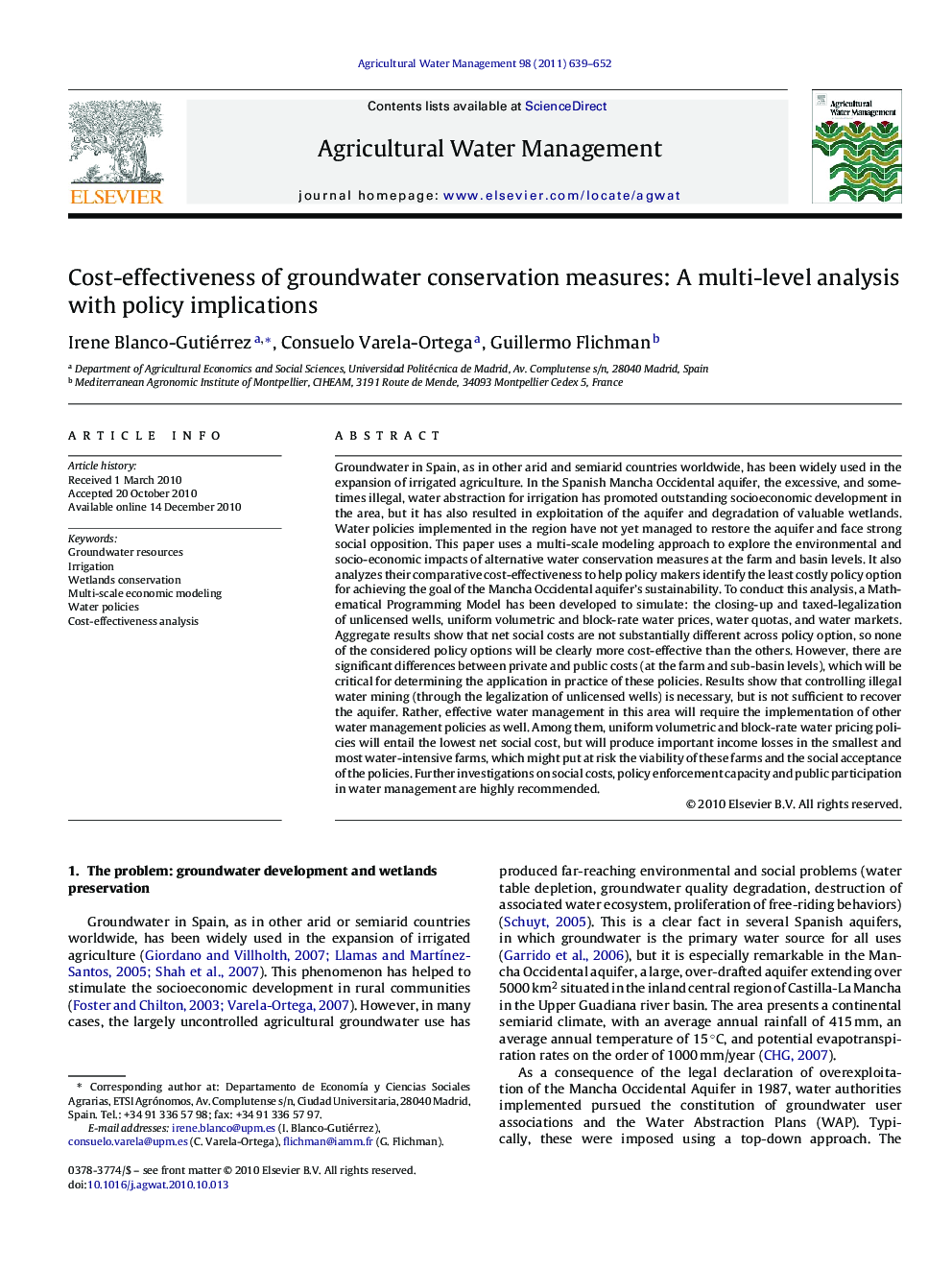| Article ID | Journal | Published Year | Pages | File Type |
|---|---|---|---|---|
| 4479548 | Agricultural Water Management | 2011 | 14 Pages |
Groundwater in Spain, as in other arid and semiarid countries worldwide, has been widely used in the expansion of irrigated agriculture. In the Spanish Mancha Occidental aquifer, the excessive, and sometimes illegal, water abstraction for irrigation has promoted outstanding socioeconomic development in the area, but it has also resulted in exploitation of the aquifer and degradation of valuable wetlands. Water policies implemented in the region have not yet managed to restore the aquifer and face strong social opposition. This paper uses a multi-scale modeling approach to explore the environmental and socio-economic impacts of alternative water conservation measures at the farm and basin levels. It also analyzes their comparative cost-effectiveness to help policy makers identify the least costly policy option for achieving the goal of the Mancha Occidental aquifer's sustainability. To conduct this analysis, a Mathematical Programming Model has been developed to simulate: the closing-up and taxed-legalization of unlicensed wells, uniform volumetric and block-rate water prices, water quotas, and water markets. Aggregate results show that net social costs are not substantially different across policy option, so none of the considered policy options will be clearly more cost-effective than the others. However, there are significant differences between private and public costs (at the farm and sub-basin levels), which will be critical for determining the application in practice of these policies. Results show that controlling illegal water mining (through the legalization of unlicensed wells) is necessary, but is not sufficient to recover the aquifer. Rather, effective water management in this area will require the implementation of other water management policies as well. Among them, uniform volumetric and block-rate water pricing policies will entail the lowest net social cost, but will produce important income losses in the smallest and most water-intensive farms, which might put at risk the viability of these farms and the social acceptance of the policies. Further investigations on social costs, policy enforcement capacity and public participation in water management are highly recommended.
Research highlights▶ The result show that attaining the target of the aquifer's sustainability would require an effective and simultaneous combination of measures addressed to control water consumption and halting illegal drilling. ▶ Our findings indicate that groundwater prices promote water saving, but they inflict substantial income losses upon small farms with rigid cropping patterns. A comparative policy analysis between the two selected water pricing schemes leads to the conclusion that block-rate water prices would provide fewer revenue collections to the water authority, but would mean lower income losses for farmers. ▶ Equally distributed water quotas can also achieve the environmental objective of the aquifer's conservation by reducing groundwater consumption and inequity among farmers. When the previously established water use quotas are traded on a market-based mechanism, only small amounts of water are actually exchanged, providing small income gains. ▶ From this study we can infer that none of the considered water conservation policies (water pricing, water quota, water market) is clearly more cost-effective than the others. Aggregate results show that net social costs are not substantially different across policy options. However, there are important differences between private and public costs (at farm and sub-basin level), which may influence the political viability of the various options. ▶ Additional studies on net social costs are highly recommended to include long term recurrent costs, as well as policy implementation and operation costs. Other criteria not considered in this research, such as the policy enforcement capacity and level of social acceptance, should also be taken into consideration.
